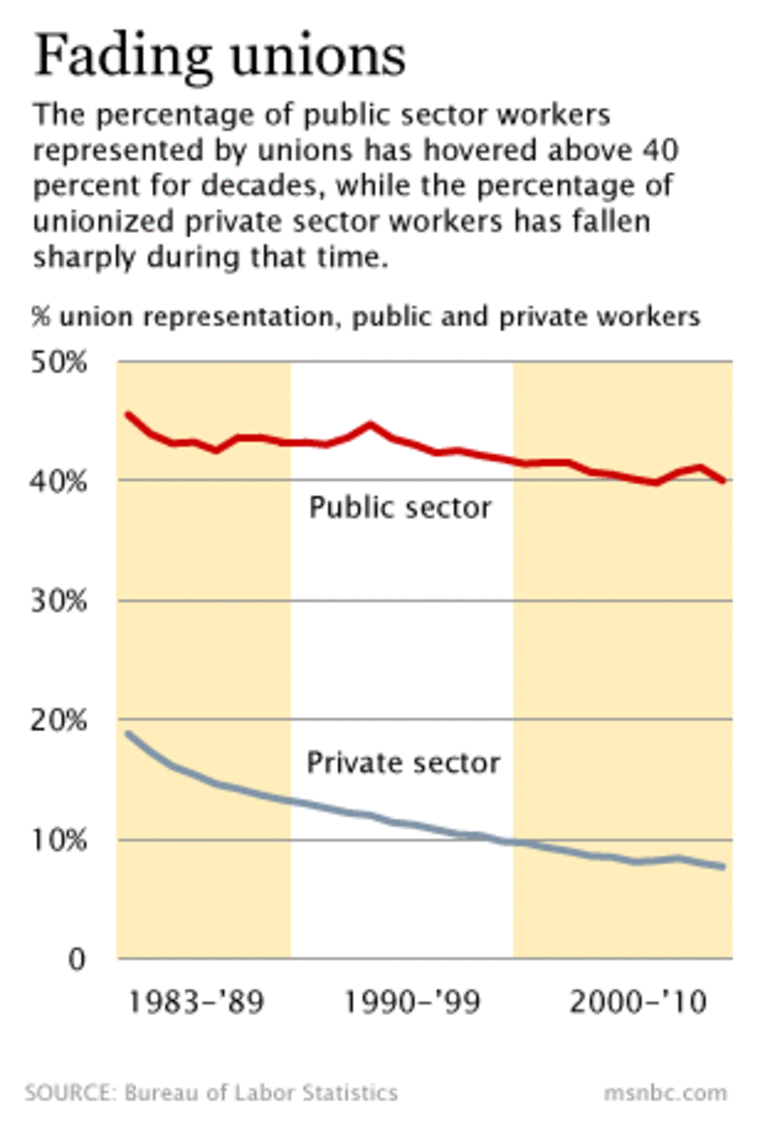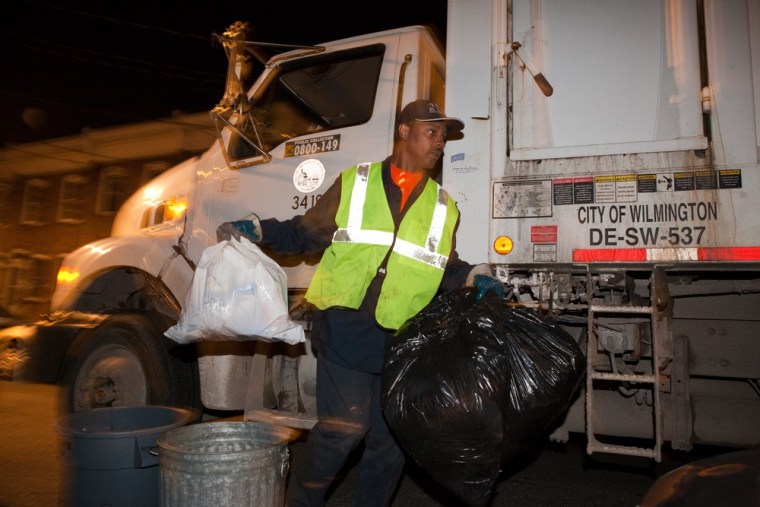They take away your trash. They protect your homes, your property and your families. They put out your fires and they educate your children. And somehow, in the past year or so, the uniforms many of them wear have grown a bull's-eye on the back. Or at least that's how they feel.
After the worst recession since the Great Depression, as state and local governments struggle to meet budgets with dwindling revenues, public union workers have become targets of politicians, pundits and ordinary citizens who think their salaries are too high and their jobs too cushy.
That has left many public union workers feeling misunderstood.
“We make $35,000 a year, and they want to throw stones at public workers,” said Roland Bell, 44, a sanitation worker in Wilmington, Del. "They don’t know half of what our jobs entail.”
Bell's hurt feelings and anger are being echoed across the country as unionized workers defend their pay and benefits from attacks by legislators in state after state. Undeterred by protests in some state capitals, lawmakers have moved forward with efforts to cut costs by reducing worker pay and benefits or gutting collective bargaining rights.
“Several things came together that have resulted in the fiercest attack on public workers that I can remember,” said Harley Shaiken, a professor at University of California at Berkeley who specializes in labor issues.
The campaign to curtail public union power has played out in a wide variety of state moves:
• In Wisconsin, Republican lawmakers have pushed through a law that severely curtails many union workers’ collective bargaining rights and asks most public workers to contribute more to pensions and health insurance. The effort has been stalled by legal challenges, however, and an effort to recall politicians who voted for it is under way.
• In Ohio, a Republican-backed bill to restrict public union workers’ rights to strike and bargain collectively has moved through the Legislature. Democrats and union workers are planning to fight it with a referendum.
• In Indiana, Democrats fled the state for five weeks to protests proposals that they saw as restricting worker rights and lowering wages. They returned only after gaining some concessions from Republicans.
• In Idaho, a bill restricting public teachers’ bargaining rights has already passed.
• In Florida, Gov. Rick Scott recently signed into law a bill that limits teachers to one-year contracts and bases merit pay in part on how much improvement students show.
• In Maine, the newly elected Republican governor Paul LePage ordered the removal of a mural depicting the state’s labor history because it was at odds with his administration’s pro-business agenda.
"Workers and employers need to work together to create opportunity for Maine’s 50,000 unemployed," said Adrienne Bennett, LePage's press secretary, in a statement. "We understand that not everyone agrees with this decision, but the Maine Department of Labor has to be focused on the job at hand."
The proposals have left workers grappling with potential pay and benefit cuts, changes to working conditions and accusations that they don’t work hard. For some, it’s been enough to question whether they want to continue in careers they love if it means facing insults and pay cuts.
“This isn’t the career that my mom went into 35 years ago,” said Greta Voit, 27, a high school physics teacher in New Berlin, Wis.
The push has been spurred by the recession and housing bust, which has left many state and city governments in the red and desperate to cut costs.
Some lawmakers also have argued that a good way to keep costs down in the long term is to curtail public union workers’ collective bargaining rights, the basic tool used by organized labor to negotiate everything from retirement pay to working conditions.
Opponents contend the movement is just a ruse to break unions.
Politicians versus unions
In some states, the austerity proposals have divided two interest groups that often co-exist in relative peace: public workers and politicians.
Shaiken said that in better budgetary times many politicians didn’t think it was necessary or wise to pick a fight with powerful union forces, or to risk an anti-union effort that might be publicly challenged. As a result, only a few state houses took on public unions in a major way.
“Private-sector employers … have been able to be much more aggressive in anti-union campaigns than public employers are,” said Joseph Slater, a professor of law and values at the University of Toledo College of Law in Ohio.
The percentage of private-sector workers represented by unions has been on the decline for many years, falling from 18.8 percent in 1983 to 7.7 percent as of last year. Many big unions, such as those in the auto industry, have had to accept major concessions in recognition of the weak economy and the growing ability of employers to move work overseas.
In the public sector, however, the percentage of union-represented workers has dropped only slightly since the mid-1980s, to its current level of 40 percent. That includes workers who are not formally union members but are represented by unions for the purposes of contract negotiations.
Americans in general have similar feelings about public and private sector unions. A survey conducted in February by the Pew Research Center found that the same percentage of Americans — 48 percent — view both public and private unions favorably. Forty percent of those surveyed viewed public unions unfavorably, while 37 percent viewed private unions unfavorably.

The relative strength of public-sector unions is based on more than just political calculations. A private-sector employer facing a potential union drive often can threaten to move their operations to another state or even country, or to outsource the job itself to another employer.
Cities and state governments generally don't have that option.
"The public sector is a very different dynamic because you don’t have competitive enterprises who are, if they face an organizing drive, sending the message … that if a union forms here, then, you know, I might need to move these jobs,” said Joseph McCartin, an associate professor of history at Georgetown University and an expert on labor issues.
For some unionized public-sector workers, that connection to the community is a key reason they love their work.
“There’s a great deal of satisfaction when people call back after the call is over and say, ‘Your guys were wonderful. Thank you so much,'” said Ken Gilbertie, a dispatcher with the Wesport, Conn., Fire Department.
Turning point, but which way?
Labor policy experts say it’s not yet clear whether the events of this year will mark the beginning of a decline in public union power, or spark a backlash against the politicians that championed the cuts.
“I think this could be seen as a turning point either way,” McCartin said.
He notes that Wisconsin Gov. Scott Walker has seen a huge amount of pushback during his contentious effort to push through the labor bill. There is now serious talk of trying to recall state politicians who have been key to the fight.
“Is this a big trend or a big undoing of what we’ve seen in the last 50 years? I think it’s too early to tell, and I would be very cautious to say that it was,” said Slater, the Toledo professor. “I think the Republicans are taking a moment in time where people are panicked about the economy and to some extent open to notions that, ‘Gee, these other people are getting a better deal than you and that’s not fair.’”
The efforts also have put a national spotlight on public union workers, and sparked a passionate debate over the value of their work, which could end up benefiting pro-union forces.
“The labor movement is galvanized in a way that we haven’t seen in decades,” Shaiken said.
But it also could go the other way. Shaiken suspects that many politicians are waiting to see how the effort to curb collective bargaining rights works out for politicians such as Wisconsin's Walker before pushing these efforts aggressively themselves.
“If Scott Walker looks to be doing well six months to a year down the road, then I think you’ll see other states pursue this more aggressively,” he said.
Senior producer John Schoen, senior editor Patrick Rizzo and contributing writer Eve Tahmincioglu contributed to this report.
